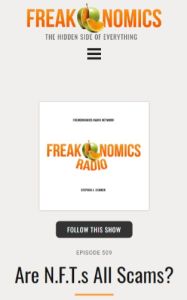Join getAbstract to access the summary!

Join getAbstract to access the summary!
Stephen J. Dubner
Are N.F.T.s All Scams?
Freakonomics Radio, 2022
What's inside?
Would you be willing to take your salary in bitcoins?
Recommendation
If you’re like a lot of people, the mere mention of NFTs makes you roll your eyes. It’s a wildly speculative market, where people are tossing around soul-crushing amounts of money because…why? Celebrity endorsements? Amusing digital artwork featuring apes? So why are so many smart people so enthusiastic about the potential of blockchain? This episode of the Freakonomics podcast may give you a better understanding.
Summary
About the Podcast
The Freakonomics podcast is created and hosted by University of Chicago economist Steven Levitt and New York Times journalist Stephen J. Dubner, based on their book of the same name. Freakonomics radio has expanded to include the podcasts No Stupid Questions; Freakonomics, MD; and People I (Mostly) Admire.


























Comment on this summary